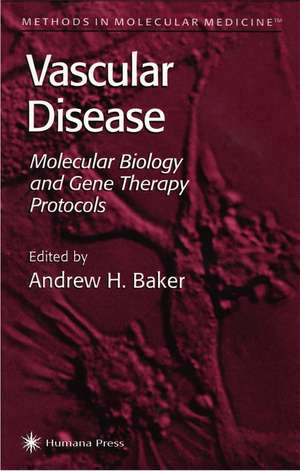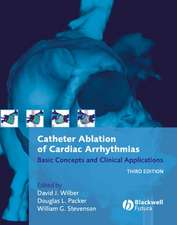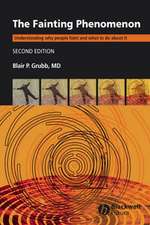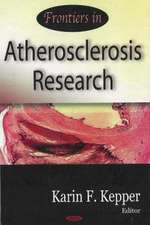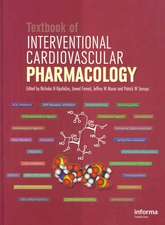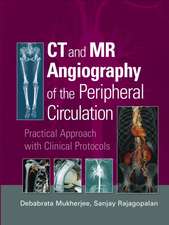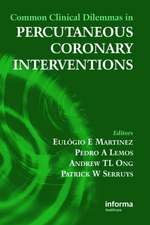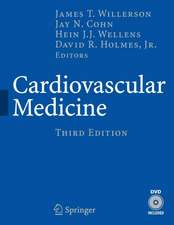Vascular Disease: Molecular Biology and Gene Transfer Protocols: Methods in Molecular Medicine, cartea 30
Editat de Andrew H. Bakeren Limba Engleză Paperback – 9 noi 2010
| Toate formatele și edițiile | Preț | Express |
|---|---|---|
| Paperback (1) | 1101.73 lei 6-8 săpt. | |
| Humana Press Inc. – 9 noi 2010 | 1101.73 lei 6-8 săpt. | |
| Hardback (1) | 731.80 lei 6-8 săpt. | |
| Humana Press Inc. – aug 1999 | 731.80 lei 6-8 săpt. |
Din seria Methods in Molecular Medicine
- 5%
 Preț: 1278.74 lei
Preț: 1278.74 lei - 15%
 Preț: 655.78 lei
Preț: 655.78 lei - 5%
 Preț: 1106.50 lei
Preț: 1106.50 lei - 5%
 Preț: 727.44 lei
Preț: 727.44 lei - 5%
 Preț: 1108.72 lei
Preț: 1108.72 lei - 15%
 Preț: 650.55 lei
Preț: 650.55 lei - 5%
 Preț: 735.66 lei
Preț: 735.66 lei - 18%
 Preț: 947.35 lei
Preț: 947.35 lei - 18%
 Preț: 948.92 lei
Preț: 948.92 lei - 5%
 Preț: 1114.54 lei
Preț: 1114.54 lei - 5%
 Preț: 1114.91 lei
Preț: 1114.91 lei - 15%
 Preț: 658.55 lei
Preț: 658.55 lei - 5%
 Preț: 734.01 lei
Preț: 734.01 lei - 5%
 Preț: 1111.61 lei
Preț: 1111.61 lei - 5%
 Preț: 1104.32 lei
Preț: 1104.32 lei - 5%
 Preț: 723.21 lei
Preț: 723.21 lei - 5%
 Preț: 1106.13 lei
Preț: 1106.13 lei - 5%
 Preț: 723.05 lei
Preț: 723.05 lei - 5%
 Preț: 1108.35 lei
Preț: 1108.35 lei - 5%
 Preț: 723.42 lei
Preț: 723.42 lei - 5%
 Preț: 1115.65 lei
Preț: 1115.65 lei - 5%
 Preț: 786.86 lei
Preț: 786.86 lei - 5%
 Preț: 1133.01 lei
Preț: 1133.01 lei - 5%
 Preț: 1114.71 lei
Preț: 1114.71 lei
Preț: 1101.73 lei
Preț vechi: 1159.71 lei
-5% Nou
Puncte Express: 1653
Preț estimativ în valută:
210.84€ • 219.31$ • 174.06£
210.84€ • 219.31$ • 174.06£
Carte tipărită la comandă
Livrare economică 12-26 aprilie
Preluare comenzi: 021 569.72.76
Specificații
ISBN-13: 9781617371554
ISBN-10: 1617371556
Pagini: 456
Ilustrații: XV, 441 p.
Dimensiuni: 152 x 229 x 27 mm
Greutate: 0.6 kg
Ediția:Softcover reprint of hardcover 1st ed. 1999
Editura: Humana Press Inc.
Colecția Humana
Seria Methods in Molecular Medicine
Locul publicării:Totowa, NJ, United States
ISBN-10: 1617371556
Pagini: 456
Ilustrații: XV, 441 p.
Dimensiuni: 152 x 229 x 27 mm
Greutate: 0.6 kg
Ediția:Softcover reprint of hardcover 1st ed. 1999
Editura: Humana Press Inc.
Colecția Humana
Seria Methods in Molecular Medicine
Locul publicării:Totowa, NJ, United States
Public țintă
ResearchCuprins
Genetics in Vascular Disease.- Detection of Mutations and DNA Polymorphisms in Genes Involved in Cardiovascular Diseases by Polymerase Chain Reaction-Single-Strand Conformation Polymorphism Analysis.- Analysis of Genetic Variants in Cardiovascular Risk Genes by Heteroduplex Analysis.- Radiation Hybrid (RH) Mapping of Human Smooth Muscle-Restricted Genes.- Isolation of Genes Expressed in Vasular Tissue.- Efficient Extraction of RNA from Vascular Tissue.- Preparation of cDNA Libraries from Vascular Cells.- Screening cDNA Libraries Using Partial Probes to Isolate Full-Length cDNAs from Vascular Cells.- Cloning Full-Length cDNAs from Vascular Tissues and Cells by Rapid Amplification of cDNA Ends (RACE) and RT-PCR.- Use of cDNA Representational Difference Analysis to Identify Disease-Specific Genes in Human Atherosclerotic Plaques.- The Use of Differential mRNA Display (DDRT-PCR) to Identify Genes Differentially Expressed in Normal and Diseased Vascular Cells.- Identification of Novel Protein Kinases in Vascular Cells.- Methods for Mapping Transcriptional Start Sites and Measurement of Promoter Activity in Vascular Cells.- Primer Extension Analysis to Map Transcription Start Sites of Vascular Genes.- Use of Liposome-Mediated DNA Transfection to Determine Promoter Activity in Smooth Muscle Cells.- Nuclear Run-On Assay to Study Gene Transcription in Vascular Cells.- Electromobility Shift Analysis (EMSA) Applied to the Study of NF-kappa B Binding Interactions in Vascular Smooth Muscle Cells.- Molecular Analysis of MRNA Expression in Vascular Cells.- Measurement of Gene Expression in the Vascular Wall by Reverse Transcription-Polymerase Chain Reaction (RT-PCR) Analysis.- Northern Blot Analysis to Quantify Gene Expression in Vascular Diseases.- Localization of Gene Expression inHuman Atherosclerotic Lesions by In SituHybridization.- RNase Protection Assays for Quantitation of Gene Expression in Vascular Tissue.- Molecular Methods to Study Apoptosis and Phenotypic Changes in Vascular Cells and Tissus.- Detection of Apoptosis in Atherosclerosis and Restenosis by Terminal dUTP Nick-End Labeling (TUNEL).- In Vitro Detection of Apoptosis in Isolated Vascular Cells.- Molecular Assessment of the Phenotypic Changes Associated with Smooth Muscle Cells Using Two-Dimension Electrophoresis and Microsequence Analysis.- In Vitro Methods to Express Foreign Genes in Vasular Cells.- Simple Methods for Preparing Recombinant Adenoviruses for High-Efficiency Transduction of Vascular Cells.- Generation of Recombinant Adeno-Associated Viruses for Delivery of Genes into Vascular Cells.- Hemagglutinating Virus of Japan Liposome-Mediated Gene Delivery to Vascular Cells.- High-Efficiency and Low-Toxicity Adenovirus-Assisted Endothelial Transfection.- Gene Transfer in Vascular Cells Using an Engineered Na-H Exchanger (NHE1) as a Selectable Marker.- Use of Retroviruses to Express Exogenous Genes in Vascular Smooth Muscle Cells.- Embryonal Stem (ES) Cell-Derived Macrophages.- Delivery of Recombinant Adenoviruses to Human Saphenous Vein.- In Vivo Vascular Gene Transfer Protocols.- An In Vivo Angiogenesis Assay to Study Positive and Negative Regulators of Neovascularization.- Efficient Liposome-Mediated Gene Transfer to Rabbit Carotid Arteries In Vivo.- Gene Delivery to Rabbit Arteries Using the Collar Model.- Delivery of Antisense Oligonucleotides to the Vascular Wall.- Local Gene Delivery of Recombinant Adenoviruses to the Rat Carotid Artery In Vivo.
Recenzii
"...The chapters are clearly written so that complex techniques are reduced to their individual components...this book will be a major asset to a molecular biology laboratory involved in vascular research."-Atherosclerosis
"This collection of very detailed molecular biology protocols was compiled...The first five parts present protocols that are designed to identity and characterize genes in cardiovascular disease, including methods for detecting specific gene mutation, identifying new genes, characterizing the levels and regulation of expression of the new genes, and apoptotic methods. The final two parts contain in vivo and in culture gene transfer protocols used in cardiovascular disease and protocols for clinical gene therapy....an excellent reference for molecular biologists in the field of vascular disease." - Quarterly Review of Biology
"...the authors of the individual chapters have made every effort to relate their particular techniques to the study of vascular tissues....the editor has assembled a broad base of well established authors to describe their protocols....this is a good book....this book may prove worthwhile in helping to ease the load on the typical physician-scientist trying to care for patients and at the same time direct his or her laboratory research program."- Texas Heart Institute Journal
"The book is the result of the contribution of distinguished experts in the field. Each chapter of the book is introduced by a theoretical summary of the goal of the technique with excellent diagrams followed by the material used, the basic procedures and the methods. Critical notes and references end each chapter. This important publication directed to molecular biologists covers the latest aspects of molecular procedures for the study of cardiovascular diseases and confirms, if necessary, the irreversible revolution in cardiovascular research."- Acta Cardiologica
"This collection of very detailed molecular biology protocols was compiled...The first five parts present protocols that are designed to identity and characterize genes in cardiovascular disease, including methods for detecting specific gene mutation, identifying new genes, characterizing the levels and regulation of expression of the new genes, and apoptotic methods. The final two parts contain in vivo and in culture gene transfer protocols used in cardiovascular disease and protocols for clinical gene therapy....an excellent reference for molecular biologists in the field of vascular disease." - Quarterly Review of Biology
"...the authors of the individual chapters have made every effort to relate their particular techniques to the study of vascular tissues....the editor has assembled a broad base of well established authors to describe their protocols....this is a good book....this book may prove worthwhile in helping to ease the load on the typical physician-scientist trying to care for patients and at the same time direct his or her laboratory research program."- Texas Heart Institute Journal
"The book is the result of the contribution of distinguished experts in the field. Each chapter of the book is introduced by a theoretical summary of the goal of the technique with excellent diagrams followed by the material used, the basic procedures and the methods. Critical notes and references end each chapter. This important publication directed to molecular biologists covers the latest aspects of molecular procedures for the study of cardiovascular diseases and confirms, if necessary, the irreversible revolution in cardiovascular research."- Acta Cardiologica
Textul de pe ultima copertă
In Vascular Disease: Molecular Biology and Gene Therapy Protocols, Andrew Baker and a noted panel of expert investigators describe today's most powerful molecular methods for investigating the pathogenesis of vascular disease. These detailed, easy-to-follow techniques range from methods that have been used successfully to identify specific mutations involved in cardiovascular disorders, to those for transferring genes associated with cardiovascular disease into various vascular cell types by in vitro and in vivo routes. There are methods to identify novel genes and generate full-length cDNAs, to study gene transcription and promoter activity easily and effectively, and to ascertain precisely gene expression levels within the individual cell types in different pathophysiological conditions. Accurate methods to quantify apoptosis in both cultured cells and pathological specimens are also given. Vascular Disease: Molecular Biology and Gene Therapy Protocols offers today's vascular biologist and gene therapist an unprecedented ability to study the pathogenesis of vascular disease and readily to probe the potential for gene-based therapies. Powerful and productive, the techniques presented here operate across a wide range of exciting research areas, and promise spectacular therapeutic breakthroughs in the ongoing battle against vascular disease.
